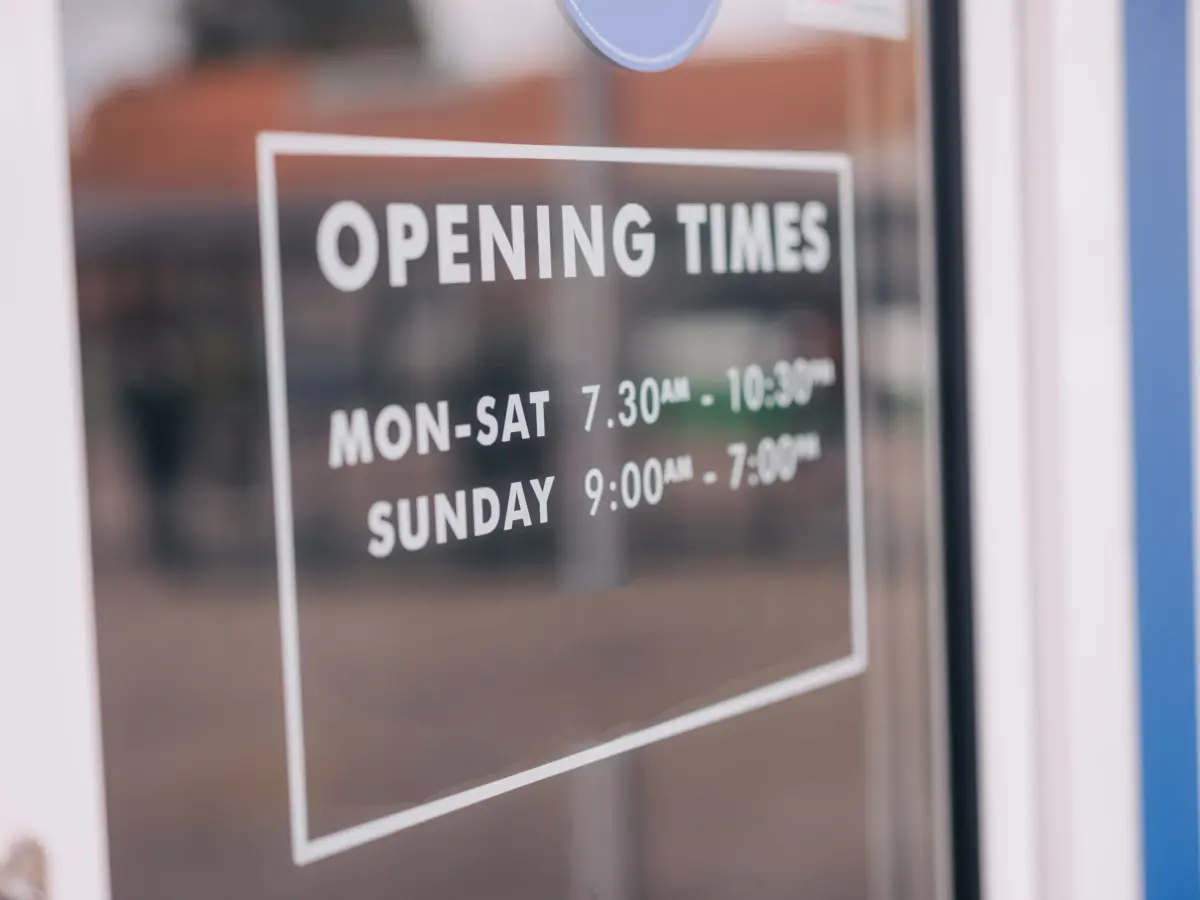Opening hours (including unplanned temporary closures)
Published on: 11th July 2013 | Updated on: 6th April 2025
Pharmacy opening hours are part of pharmacies’ Terms of Service for providing NHS pharmaceutical services.
Most pharmacies must open for 40 core contractual hours (this includes Distance Selling Premises (DSP) pharmacies).
Some pharmacies must open between 72-100 core contractual hours (called 100-hour pharmacies for those that have opened under the former exemption from the control of entry test).
All pharmacies may open for additional supplementary hours.
Pharmacies are not required to open (to provide core contractual hours) on, for example, Bank holidays but some may be directed by the NHS to provide Bank holiday opening hours.
On occasion, pharmacies may have to close. This may be a planned temporary closure, for example, for the refurbishment of the premises, or an unplanned temporary closure, if, for example, that morning the pharmacist reports they are ill and unable to work.
In 2023, regulations were laid to make changes to the NHS (Pharmaceutical and Local Pharmaceutical Services) Regulations 2013 that added provisions for rest breaks, reduction of core hours for 100-hour pharmacies, requirements to change core opening hours and local hours plans. More information on these changes and a briefing can be found on the PLPS Regulations May 2023 Amendment page.
Temporary pharmacy closures
It is a Terms of Service requirement for each NHS community pharmacy owner to have a business continuity plan for a temporary unplanned closure due to illness or other reasons beyond their control, and to action this plan when necessary.
Forthcoming changes to regulations around core opening hours
On Monday 31st March 2025, the details of the contractual settlement for 2025/26 were announced, which included changes to regulations around core opening hours.
These changes are explained in the 2025/26 contractual settlement changes section below.
Click on a heading below for more information.
NHS England has overall responsibility for administering opening hours for pharmacies, since 2023 this responsibility has been delegated to the Integrated Care Boards (ICBs).
A pharmacy normally has 40 core contractual hours (or 100 for those that have opened under the former exemption from the control of entry test), which cannot be amended without the consent of NHS England, together with supplementary hours, which are any the additional opening hours, which can be amended by the pharmacy subject to giving five weeks notice (or less if an ICB consents). A pharmacy may also have more than 40 core hours where it has made an application based on that higher number, and NHS England (or the ICB) agreed to that application, in this case, the pharmacy cannot amend these hours without the consent of the ICB.
There is also a provision which allows a pharmacy to apply to open for less than 40 hours, but if an ICB does grant such an application, it can specify which opening hours the pharmacy must open.
The Terms of Service require every pharmacy to send a return to the ICB on request, specifying the opening hours (both core contractual and supplementary hours). An ICB may use this power to request a return if there is any doubt about the actual opening hours.
In addition to the above, an ICB can commission an out-of-hours Enhanced service. This service may operate under arrangements similar to the former rota arrangements throughout the year or could be limited for example to public holidays. For many pharmacies, participation in such arrangements is voluntary, but those pharmacies which opened under the exemptions for 100-hour pharmacies, those in approved large retail areas, and those in one-stop primary care centres may have been required by the terms of their application, to provide any Advanced or Enhanced Services that were agreed during the course of the application where an ICB commissions the service.
As a fall back position, if the needs of people in the area are not met, and no pharmacies are able or willing to participate in an out of hours Enhanced service, an ICB has the power to issue a direction requiring the pharmacy to open, but must if doing so ensure the pharmacy receives reasonable remuneration. The process of issuing such a direction begins with discussions with the LPC and the affected pharmacies must be contacted by the ICB and the proposals outlined so that the pharmacy owner can make representations. There are rights of appeal against ICBs decisions to issue such directions, and the direction would be valid only if the statutory procedure is followed. If you need advice on such a direction, consult your LPC (which the ICB is required to consult before issuing such directions).
Pharmacy owners who want to change their core contractual hours (core opening hours) must apply to the ICB.
Pharmacy owners have no right to change core opening hours, but must apply for any changes. This is not a notification procedure. Consequently, applications to change core opening hours may be granted or refused. An ICB is required, to consider and determine applications within 60 days, and any changes, if approved, may be implemented only after 30 days (from the date approval).
The success of an application will depend on many factors, and a pharmacy owner should ensure evidence is provided to show that the pharmacy will either:
- maintain the existing level of NHS pharmacy provision; or
- maintain a sustainable level of adequate NHS pharmacy provision where maintaining the existing level of provision is either unnecessary or not realistically achievable.
Evidence could include, for example, changes to the local surgery hours, and the opening hours of neighbouring pharmacies, but provide as much factual information as possible about the needs of the pharmacy’s patients – patient surveys, records of levels of use (prescriptions and requests for advice / OTC medicines sales).
Recent appeal cases (which can be found on the Primary Care Appeals decisions website) identify key evidence as the distance from the pharmacy to nearby pharmacies, how patients could travel to them, the opening hours of them and the services those pharmacies offer.
Applications could also include survey data, for the hours change applied for, to show how patients are traveling to the pharmacy and the reason for their visit (e.g. dispensing services).
Providing evidence to show that maintaining the existing level of provision is not realistically achievable is more problematic for applicants with the appeals decisions noting ‘this sets a fairly high bar as to the level of difficultly that the Applicant must find themselves in’. Therefore if an application is relying on this provision they must show sufficient evidence to indicate that the economic and practical viability of the current opening hours has been compromised.
There is a template application form for submitting to ICBs (see Chapter 36, Annex 2 – Application form – application to change core opening hours) and the relevant ICB email address on the pharmacy contract teams’ web page.
If an application is not granted the applicant has the right of appeal and must be made to an officer or employee of the NHS Litigation Service or a committee established in accordance with the Directions to the Primary Care Appeals Service. The Primary Care Appeals service, may confirm the decision of the ICB or set aside the decision and grant the application.
If an application is successful, the pharmacy may change the core opening hours but not earlier than 30 days after the approval has been received. Pharmacy owners will also need to update their opening hours on their NHS website profile and Directory of Services (DoS) profile using the NHS Profile Manager tool, to reflect the revised opening hours.
On Monday 31st March 2025, the details of the contractual settlement for 2025/26 were announced, which included changes to regulations around core opening hours.
These changes are explained below, with further details in a briefing document that we released after the announcement of the settlement.
Amendment of regs’ test for changing the days and times of core opening hours
In recent years, many pharmacy owners have found it difficult to change the days and times of their core opening hours, which were often set many years ago.
These regulatory amendments should enable pharmacy owners to change their opening hours to days and times that better serve their patients and likely users of the pharmacy, and in some cases, close at quiet times or out-of-hours. The amendments should also support pharmacies with operational and capacity issues. Generally, pharmacies only receive NHS funding to provide NHS services, not just to be open, so they need sufficient patient numbers during opening hours to meet the costs of opening.
The Pharmacy Manual will also reflect this change and will clarify that the contractor’s evidence of the economic viability of their current opening hours should be considered alongside evidence of patient demand for the pharmacy’s services during these hours and other evidence relevant to the regulatory test.
At quiet times, out-of-hours or on Bank Holidays, patients and likely users of the pharmacy may have to travel further to a pharmacy, for example, to one of the pharmacies that were permitted to open if they provided longer opening hours. Usually, these 100-hour pharmacies (now often open for only 72 hours) are open 5 – 9 pm Monday to Saturday and 11 – 4 pm on Sunday.
Exceptionally, if an ICB wants a community pharmacy to be open at quiet times, out-of-hours or on Bank Holidays and no pharmacy is available, the ICB can go through a process to direct and separately fund the pharmacy to open. This may be assisted by an out-of-hours opening rota agreed with local pharmacy owners.
Key points are:
- Changing core opening hours remains an application process – the ICB must approve any proposed change.
- The total number of core opening hours must remain the same (another provision applies for applications to reduce the number of core opening hours).
- The new/proposed core opening hours must better meet the needs of patients and likely users of the pharmacy.
- A pharmacy owner’s evidence of the economic viability of their current opening hours may be considered by the ICB.
- The PLPS Regulations (Terms of Service) must be amended first – only then will this change be effective/apply.
- The Pharmacy Manual will be revised accordingly.
This change will only be effective after the PLPS regulations have been amended.
Pharmacy owners who want to change their supplementary opening hours are required by their terms of service to notify the relevant ICB. If a pharmacy owner wants to:
- increase supplementary opening hours at the pharmacy, notification of the change must be given to the ICB in advance of the increase but there is no notice period.
- decrease supplementary opening hours at the pharmacy, at least five weeks’ notice must be given to the ICB prior to implementing the change.
Pharmacy owners are encouraged to give the ICB as much notice of changes as they can of any changes to supplementary opening hours.
There is a template notification form for notifying ICBs (see Chapter 36, Annex 9 – Notification of changes to supplementary opening hours) and the relevant ICB email address on the pharmacy contract teams’ web page.
Pharmacy owners have the right to change supplementary opening hours so long as the required notice/notification is given. This is not an application process and there is no requirement for an ICB to approve or grant changes to supplementary opening hours.
Using the NHS Profile Manager tool, pharmacy owners will need to update their opening hours in their NHS website profile and their Directory of Services (DoS) profile, to reflect their changed opening hours.
A pharmacy owner can apply to the ICB for permission to temporarily suspend the provision of pharmaceutical services (closure of the pharmacy), for example, to close for two or three days during a planned refit. If the ICB is satisfied that the circumstances are appropriate, and at least three months notice has been given, they may agree to the suspension of services (closure of the pharmacy). Unlike changes to core hours above, there is no requirement to ‘make up’ any hours during the week of the closure.
NHS England has published a template application form (see Pharmacy Manual Chapter 36, Annex 19 – Planned temporary suspension of services) and a list of ICB email addresses.
There is no obligation for ICBs to grant applications for temporary suspensions (closure of the pharmacy), so the pharmacy owner will need to satisfy the ICB that the circumstances of the request are appropriate. Unless the ICB agrees, a pharmacy owner cannot plan to temporarily suspend services (close the pharmacy), although a pharmacy owner could change any supplementary hours, provided adequate notice is given – see above.
Following changes to the NHS (Pharmaceutical and Local Pharmaceutical Services) Regulations 2013 that were imposed in 2023, from 31st July 2023, it is a Terms of Service requirement for each NHS community pharmacy owner to have a business continuity plan for a temporary suspensions of service (closure of the pharmacy) due to illness or other reason beyond their control, and to action this plan when necessary.
Preparation:
Our briefing sets out the terms of service requirements and sets out what is required in the plan, as well as explaining how and when to implement it.
We have prepared a template plan that you could complete for the pharmacy and add to the pharmacy’s existing business continuity plan.
Your plan could include the checklist we have prepared, which may be used in the event of a temporary suspension.
In the event of an unplanned temporary suspension (closure), you must:
- notify your ICB – you should use the unplanned temporary suspension of services notification form and send the completed form to the relevant ICB team (using the relevant email address on the pharmacy contract teams’ web page) as soon as practicable and wherever possible before the start of the suspension/closure;
- use all reasonable endeavours to implement your Business Continuity Plan for Temporary Suspensions (Template Plan) and you can use the Checklist; and
- use all reasonable endeavours to resume the provision of pharmaceutical services as soon as is practicable.
This emergency closure information sheet explains the contractual, IT and other actions needed if a contractor is faced with a risk of a short-term closure of their pharmacy.
If you have a plan, implement it as required and use all reasonable endeavours to resume provision of pharmaceutical services/reopen the pharmacy, and the reason for the temporary suspension/closure is illness or other reason beyond your control, you will not be in breach of the terms of service.
A pharmacy must open to provide pharmaceutical services for its core contractual and supplementary hours each week. But, where the pharmacy would ordinarily be open on a day which is Good Friday, Easter Sunday, Christmas Day or a formally declared bank holiday, the hours that it would ordinarily be open, on those days, will be treated as having been open for the purpose of counting the core contractual hours that week. This means a pharmacy that has 8 core contractual hours on Monday to Friday, will, during the week leading up to Easter, be open for 8 hours on each of Monday to Thursday making 32 hours in total, and may close on Good Friday, because the 8 hours that the pharmacy is ordinarily open on a Friday are counted towards the 40 hours requirement, irrespective of whether the pharmacy is open. These are straightforward provisions, but the way that bank holidays are declared does cause some anomalies.
In England, the days that a pharmacy will not normally be required to open are:
- New Year’s Day
- Good Friday
- Easter Sunday
- Easter Monday
- Early May Bank Holiday
- Spring Bank Holiday
- Summer Bank Holiday
- Christmas Day
- Boxing Day
On these days, the core contractual hours at the times at which it would have ordinarily been open are counted towards the core contractual requirement without the pharmacy having to open on those days and at those times, but the pharmacy may close.
The NHS Regulations provide that Good Friday, Easter Sunday and Christmas day are always treated in this way. But, for the other days, the status of the day depends on whether it has been formally declared as a bank holiday – or whether a substitute day has been introduced. Up to date information can be found on the Government’s business website.
Because these bank holidays may vary from year to year, pharmacies need to plan ahead and identify precisely which day is declared as the bank holiday. Where, for example New Year’s Day and Boxing Day fall at the weekend there may be substitute days declared, meaning that the pharmacy might have to open on the 26th December / 1st January where these fall on a weekend.
Briefing 022/24: Bank holidays, pharmacy opening hours in 2025 and for the remainder of 2024. This briefing provides guidance for community pharmacy owners on the Terms of Service opening hours requirements for bank holidays in 2025 and the remainder of 2024.
Notification of opening intentions on bank holidays
Contractors are encouraged to inform the ICB whether their premises will be open on Bank Holidays. This information is obviously of critical importance to the ICB in order that it is able to plan pharmacy provision during holiday periods. If the ICB is not able to determine the opening hours of pharmacies, with a high degree of certainty, its option may be to issue directions to one or more pharmacies, requiring them to open. This clearly is not in the best interests of pharmacies if there are other suitable pharmacies that would have been open – so Community Pharmacy England recommends that all pharmacies notify their intentions – and then open as they have notified.
NHS England has published a template notification form (see Chapter 36, Annex 1 – Notification of opening hours on bank and public holidays) and a list of ICB email addresses.
Changes to opening hours prior to bank holidays
Community Pharmacy England would like to remind pharmacy owners that core contractual/supplementary hours can be changed by the application/notification to the ICB. For core opening hours at least 3 months should be allowed for the application, whereas for decreasing supplementary opening hours 5 weeks’ notice is required.
It is customary for some pharmacies to close early on Christmas Eve or New Year’s Eve, or other days on or adjacent to religious holidays but the Terms of Service require this to be planned, and notified to NHS England 5 weeks in advance if the hours that are affected by the early closure are supplementary hours, and subject to an application to change, at least three months in advance if the hours are core contractual. It is likely that applications to change core hours will be rejected unless the pharmacy owner demonstrates that they are able:
- maintain the existing level of NHS pharmacy provision for the people in the area or other likely users of the pharmacy; or
- maintain a sustainable level of adequate NHS pharmacy provision for the people in the area or other likely users of the pharmacy, where maintaining the existing level of provision is either unnecessary or not realistically achievable.
Q. Do lunchtimes count towards core hours?
A. If pharmaceutical services are not being provided during a lunch period, this period will not count towards the core contractual hours.
Q. What happens if I don’t wish to open for 40 hours a week?
A. Contractors need to apply to NHS England for consent to open for fewer than 40 hours. NHS England is required to consider the pharmaceutical needs in the area before determining whether to grant such an application. In addition, where NHS England does decide to grant consent to a contractor to open for fewer than 40 hours, it is able to direct which hours in the week the pharmacy must open. This may not necessarily be the hours chosen by the contractor, so contractors should consider carefully, whether to make such an application.
Q. What if the pharmacy cannot open for the required number of hours due to a planned event (e.g. an external training event)?
A. If there is a planned change of hours, then there would be a need to ensure the pharmacy is still open for the required number of hours in the week. NHS England should be given the three months’ notice about the change.
Q. What if the pharmacy cannot open for the required number of hours due to events beyond control of the pharmacy?
A. According to the regulations, contractors must notify NHS England of any unplanned closures for staff illness or other reasonable cause, defined as something that is beyond a contractor’s control. Pharmacy owners should make arrangements to notify the ICB, use all reasonable endeavours to implement their Business Continuity Plan for Temporary Suspensions, and use all reasonable endeavours to resume the provision of pharmaceutical services as soon as is practicable.
As long as a contractor complies with these requirements, they will not be in breach of the terms of service under the NHS Regulations.
Community Pharmacy England Briefing 023/23: Business Continuity Plan for Temporary Suspensions provides further information on what contractors should do in this circumstance.
Q. Can NHS England force me to open for extra hours over and above my core contractual hours?
A. Provided the pharmacy is opening for the minimum of 40 (or 100 or other core contractual) hours, NHS England is able to issue a direction to the pharmacy to open for longer hours, but only if it is satisfied that the pharmacy will receive reasonable payment. There is a right of appeal where NHS England directs a pharmacy to open for additional hours. Contractors are advised to contact their LPC if NHS England writes to suggest that it is intending to issue such a direction.
Q. Can NHS England refuse my application for amendment to my core contractual hours?
A. NHS England is able to refuse an application to amend the core contractual hours, subject to a right of appeal. The success of an application will depend on many factors, and pharmacists making applications should ensure they provide good evidence to show you are able:
- to maintain the existing level of NHS pharmacy provision; or
- to maintain a sustainable level of adequate NHS pharmacy provision where maintaining the existing level of provision is either unnecessary or not realistically achievable.
NHS England is not able to refuse to accept notification of amendment to hours that the pharmacy opens additional to the core contractual hours, although three months notice must be given.
Q. The pharmacy has notified NHS England as soon as possible that for a reason beyond the control of the contractor, we could not open for our full number of contracted hours during the week, can NHS England insist that that we ‘make up’ these hours?
A. Where there is a temporary interruption of services, and this is outside the control of the pharmacy, and the pharmacy notifies the ICB as soon as practical and uses all reasonable endeavours to implement their Business Continuity Plan for Temporary Suspensions and resume pharmaceutical services as soon as is practicable, there is no obligation to make up the hours.
Community Pharmacy England Briefing 023/23: Business Continuity Plan for Temporary Suspensions provides further information on what contractors should do in this circumstance.
Q. When does a week start and end when calculating the hours that a pharmacy is open?”
A. There is currently no interpretative provision in the pharmacy regulations. However, the guidance issued by NHS England regional offices is that the week begins at 00:00 on Monday and ends at 23:59 on Sunday.
Q. The local surgery has decided to extend its opening hours. Do I need to give three months notice before I increase my supplementary hours to provide cover for those extended hours?
A. No, changes were made to the regulations to allow pharmacy owners to increase their supplementary opening hours without a notice period (however, notification is still required), to decrease supplementary opening hours 5 weeks’ notice must be given.
Q. What if Boxing Day is on a Saturday or Sunday?
A. Contractors are reminded that if Boxing Day falls on a Saturday or Sunday it will be classed as a normal day for the purposes of community pharmacy opening hours. Therefore, pharmacies must open on the 26th December for any core and supplementary hours. The substitute bank holiday for Boxing Day is when contractors do not have to open.
Contractors do not have to open on days which are specifically mentioned in the relevant NHS Regulations (namely Christmas Day, Good Friday and Easter Sunday) or a day which has been specifically designated as a ‘bank holiday’, unless directed to open by NHS England.
If contractors want to reduce any supplementary hours, for example, to close early, they must give notice to NHS England at least three months in advance, unless NHS England agrees otherwise. So, the last day to give notice for 26th December, for any guaranteed reduction in supplementary hours, is on 26th September, and NHS England must receive the notification, for example, by email, on or before that date.
Briefing 023/23: Business Continuity Plan for Temporary Suspensions
This Briefing provides guidance for community pharmacy owners and their teams on the requirements for a Business Continuity Plan for Temporary Suspensions.
Briefing 010/23: Pharmacy opening hours in 2024 and for the remainder of 2023(new)
This Briefing provides guidance for community pharmacy contractors on the Terms of Service opening hours requirements around bank holidays for 2024 and for the remainder of 2023.
Briefing 024/22: Emergency closure checklist for community pharmacy
This Briefing explains the contractual, IT and other actions needed if a contractor is faced with a risk of a short-term closure of their pharmacy because of COVID-19 or for another reason.
NHS England: Pharmacy Manual – List of annexes
NHS England: Pharmacy Manual – Template application forms
The National Health Service (Pharmaceutical and Local Pharmaceutical Services) Regulations 2013
For more information on this topic please email regulations.team@cpe.org.uk












